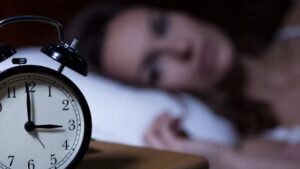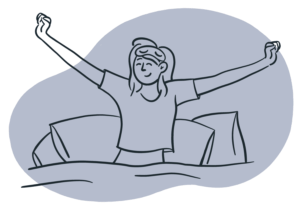Travel and Sleep Guide
Disclosure: By clicking on the product links in this article, Mattress Nerd may receive a commission fee at no cost to you, the reader. Read full disclosure statement.
Getting a good night’s sleep can make traveling a much more pleasant experience whether you’re away from home for business or for pleasure. Unfortunately, getting to your destination and actually being in your new locale can sabotage your sleep.
The problem is apparently rampant. According to Wakefield Research’s eighth annual Relaxation Report for Princess Cruises, a whopping 63 percent of Americans struggle with a good night’s sleep while on vacation.
“Our bodies have an internal clock, also known as the circadian rhythm, that lets us know when it’s time to wake up and time to sleep,” says Finn Cardiff, a travel expert and founder of Beachfix. “When we travel, our internal clock becomes compromised as we are usually no longer in the same time zone. This means we have to change this rhythm in order to be awake and sleep at the right time. It can take a while for us to become use to this.”
There are many factors that leave you glassy-eyed at bedtime and especially groggy during the day — jet lag, schedule changes, travel-related stresses, changes in your consumption of food and beverages, even worries about traveling as the coronavirus pandemic drones on. But don’t give up hope. It is possible to get a good night’s rest while in transit to your destination and once you arrive there.
We asked sleep experts to explain how and why travel impacts sleep and offer tips on how to overcome the obstacles. Here’s what they said:
How travel can affect your sleep
You want to be well rested when traveling whether you’re leaving home for business or pleasure. But it’s difficult when you’re left tossing and turning in bed at night struggling to fall asleep. Next-day drowsiness due to poor sleep the night before can make it difficult to stay sharp and focused for business presentations or interested and engaged during tours of new sites and sounds. Sleep deprivation is linked to heightened anxiety, excessive daytime sleepiness, moodiness, and poor decision-making. Over time, lack of adequate sleep can affect health leading to weight gain, diabetes, and high blood pressure, among other ailments. Here’s a closer look at how various factors can affect your sleep while traveling:
Jet Lag
Traveling across time zones and adjusting to a new schedule can confuse your circadian rhythm and leave you feeling groggy the first few days of a trip and upon your return home. Jet lag usually occurs when you travel at least two time zones, but can occur with even a one-hour change as seen with the change to and from daylight saving time. Jet lag is probably one of the biggest factors that sabotage sleep, but it’s not the only one.
Travel Fatigue
Even vacations can wear on you mentally and physically, leading to travel fatigue with symptoms such as exhaustion, insomnia, headaches, and general discomfort. Travel fatigue is often brought on by factors such as:
- Fear of flying or mode of transportation
- Worry over leaving home
- Motion sickness
- Stressing over travel details
- Layovers and travel delays
- Discomfort trying to sleep in planes, trains, cars, or airports
- Gastrointestinal issues such as dehydration, bloating, or constipation
- Stuffy noses and sinus issues from being cooped up in airplane cabins
- Interruptions or delays in food and water consumption
- Stiffness and soreness from sitting for long periods of time
Schedule Changes
Most people are creatures of habit, but travel often throws schedules into chaos. You may be staying up later, waking later in the day, and even eating at irregular times. All of these things which have an adverse effect on your sleep.
Sleeping in an Unfamiliar Setting
Being in a new city, state, or country can be an exciting experience, but sleeping in an unfamiliar place — even places that promote relaxation such as a resort or spa — can also leave you feeling vulnerable or out of sorts, preventing you from relaxing and sleeping well.
Adjusting to different time zones and avoiding jet lag
Whether you are traveling across the country or halfway around the world, chances are you’ll deal with jet lag.
“Jet lag is a common sleep problem after long haul traveling across different time zones,” says Jay Riggs, CBD enthusiast and wellness expert at Zeal CBD. “It can enhance headaches and increase difficulty sleeping due to the abrupt change in the body’s internal clock.”
It usually takes 1 to 1.5 days per time zone for your circadian rhythm to get back in sync, though for some people — especially international travelers — it can take weeks. Jet lag appears to be worse for travelers who fly east through time zones, those who arrive in the morning as opposed to the afternoon, and older travelers.
So how do you better manage jet lag? Here are some expert tips:
- Sleep or stay awake while in transit depending on your arrival time. For example, if you’re arriving in the early morning, try to sleep during the flight. Or if you’re arriving in the evening, force yourself to stay awake until you arrive at your destination. Try walking down the aisles or stretching to feel energized.
- Reset your watch to the time zone to which you are traveling. This will get your mind used to the time at your travel destination.
- Adjust your sleep schedule before you leave. A few days before your trip begin moving your bedtime and wake time up or back, closer to your destination’s time zone. You can start in increments as little as 15 or 30 minutes.
- Enjoy the sunshine. Natural daylighting activates the circadian rhythm, triggering wakefulness during the daylight hours. It also encourages sleep when darkness falls at night.
- Order a cup o’ joe. Coffee is packed with caffeine and can get you a boost if you’re beginning to wind down too early in the day. But avoid caffeine too late in the afternoon as the stimulating effects of caffeine can stay in the system for up to six hours.
- Try supplemental melatonin. The body’s natural sleep hormone, melatonin, is also available as a dietary supplement and is a more natural way to encourage sleep than sleeping pills. If you’re having trouble falling asleep at night en route to or at your travel destination, try popping some melatonin before bedtime.
How to sleep better while traveling
Getting to your destination can also affect your sleep whether you’re arriving by car, plane, bus, or train. Here are some tips to help you improve sleep while traveling.
Be comfortable. Regardless of your mode of travel, you’re likely to be doing a lot of sitting. Be sure your clothes are comfortable, lightweight, and non-binding. Bring a light jacket or sweater to ward off chills. This is especially important if you are traveling to a different climate that’s dramatically hotter or colder than your current one.
Hydrate strategically. “Travelers often don’t get enough water, so it’s important to consciously drink a lot of it before, during, and after your flight,” Miller says. “Dehydration can make it harder to fall asleep and stay asleep. It can also compound the fatigued feelings associated with jet lag.”
Limit alcohol and caffeine. Alcohol and caffeine can act as a sedative and stimulant, respectively, and can help you fall asleep or stay awake. But too much can ruin your sleep. Alcohol and caffeine can also dehydrate you.
Eat wisely. It may be tempting to eat poorly or skip meals while in transit and at your destination, but try to maintain a regular meal schedule and choose healthier foods. Making bad food choices could land you with a stomach ache, bloating, heartburn, or dreaded diarrhea.
Move a little. Sitting for long periods of time can increase your risk of developing blood clots. Because of this risk, the Centers for Disease Control and Prevention (CDC) cautions travelers to get up and walk up and down the aisles of planes or trains. If traveling by car, the CDC recommends taking regular breaks to walk around and stretch your legs. You can even exercise your calf muscles and stretch your legs while sitting, if necessary.
Tips for sleeping in hotels “away from home”
Hotels and Airbnbs can be a tricky place to catch some Zzzzs with rattling ice machines, dinging elevators, droning air conditions, and wild parties down the hall — not to mention you’re sleeping in an unfamiliar environment. But there are ways to improve your chances for better sleep. Here’s some tips:
- Check the consumer reviews. Other travelers can clue you into noise issues, safety concerns, and even the comfort of the mattress at the place you are considering staying.
- Bring your own pillow. “It can help your body relax more and trick your brain into thinking you are in your own bed,” Cardiff says.
- Pack earplugs or a sound machine to help mask noisy neighbors and clanking machines. And use a sleep mask to block out harsh sunlight.
- Drop the thermostat. Whether at home or in a hotel, you’ll sleep better with the thermostat set a few degrees colder than where you set it during the day.
- Take a warm shower or bath before bedtime. This helps lower body temperature which prepares you for sleep.
- Make special requests. When booking your hotel, ask for a room away from noisy elevators and vending machines, and avoid rooms facing pools. For larger hotels with banquet space, ask for a higher floor to put more distance between you and the parties below.
Final Thoughts
If there’s one place you want to feel well rested, it’s while you’re out of town. Whether for business or travel, your experience will be far more pleasurable if you are well rested. Unfortunately sitting in a car, train, or plane for several hours and traveling across multiple time zones can sabotage your sleep. But getting a good rest while traveling is not impossible.
The best defense is to “prepare yourself in advance,” says Drew Miller, a sleep specialist and VP of marketing at Sit n’ Sleep. “Jet lag can happen at the start of your trip, too, and who wants to be tired on vacation?”


